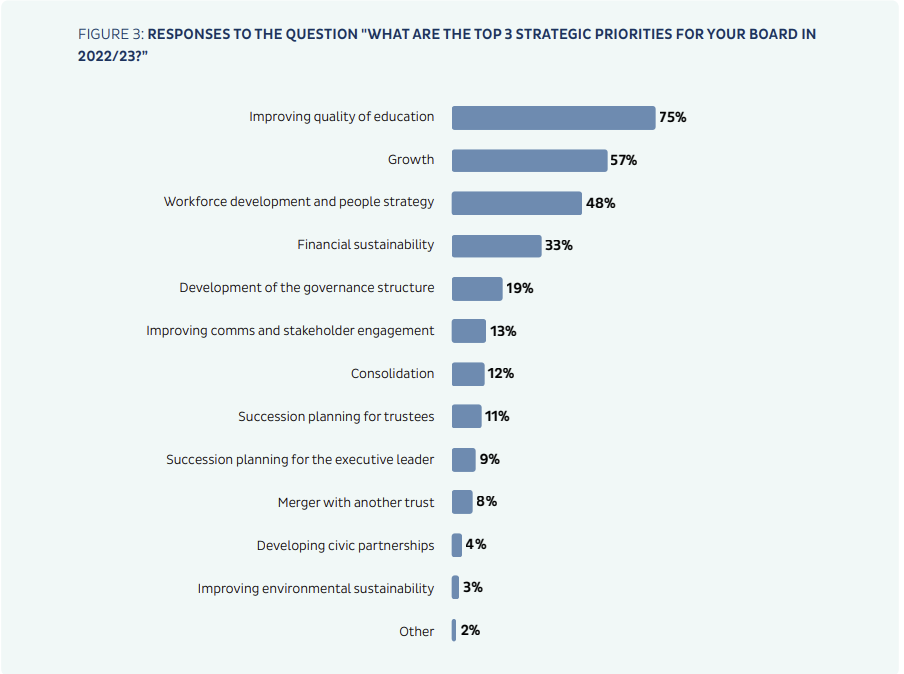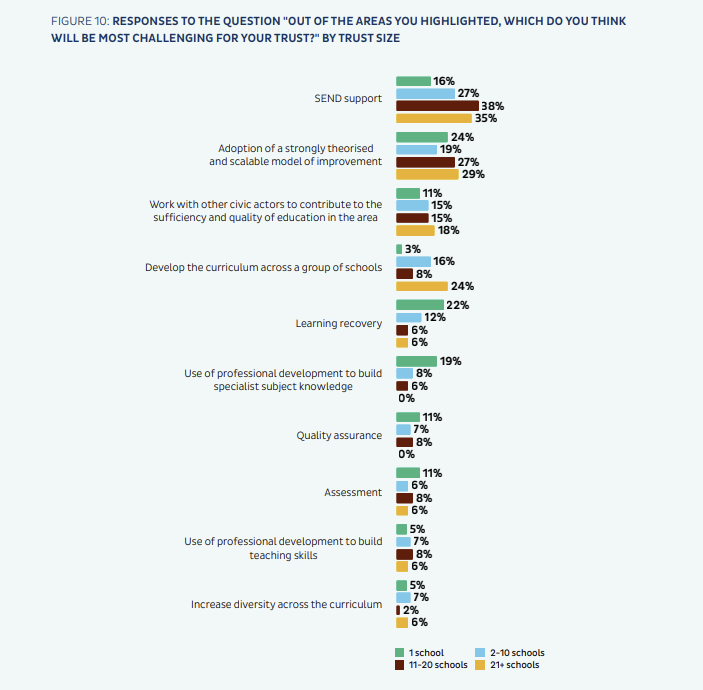Academy trusts are eyeing growth, but see it as their biggest challenge – with leaders concerned about SEND support and governor recruitment, a new study shows.
The Confederation of School Trusts has published its first national survey of school trusts report today, ahead of its annual conference kicking off in Birmingham this morning.
The study is based on a survey of 328 trust accounting officers, senior leaders involved in both accountability and governance responsibilities, in March.
Here’s what you need to know.
1. Growth focus as trusts eye 10-school sweet spot…
Fifty-seven per cent of trusts said growth was one of their top three priorities, second only to improving the quality of education (75 per cent).
The government wants all schools in “strong” trusts by 2030. Ministers also “expect that most trusts will be on a trajectory to either serve a minimum of 7,500 pupils or run at least 10 schools”.
Trusts with between two and ten schools were most likely to say growth was a priority (65 per cent), compared to just 47 per cent for single-school trusts and 13 per cent of trusts with more than 20 schools.
For larger trusts, workforce development was a much bigger focus. Half of single-school trusts said financial sustainability was a priority.

2. …but 2 in 5 say it’s also biggest challenge
Just over two in five trusts described growth as their biggest challenge – way above any over concerns (second highest was both financial sustainability and improving quality of education, with 13 per cent).
The report stated this could be seen as a positive, however, as it “shows a realisation of the fact that achieving growth without sacrificing educational quality requires careful thought and leadership”.
“Among some of the earlier trusts there have been examples of overly rapid growth leading to too much strain on systems, and in turn to negative consequences for educational quality.
“This is to be avoided as we seek the benefits of growth for improvement capacity and (financial) sustainability.”
A Schools Week investigation earlier this year found fewer than one in four schools had converted in 25 local authorities.
Some 53 per cent of existing trusts have one school, and 75 per cent have under five.
3. SEND is chief concern for big academy trusts
SEND was the third highest priority among trust leaders to improve their quality of education.
But SEND support is the area where leaders expect to see the biggest challenge, and is a bigger problem for larger trusts.
One trust said “huge energy will be taken up responding to” council cuts to SEND top up funding of 14 per cent, which they said was “catastrophic”.
“This will detract from capacity to focus on school improvement as it will necessitate remodelling work.”
A Schools Week investigation earlier this year revealed a financial black hole at the heart of the SEND system has ballooned to £1.3 billion this year, an increase of more than £450 million in just 12 months as the places crisis bites.

4. A third of trusts do not have a recovery strategy
More than three-quarters of leaders said that professional development and national qualifications for teachers and leaders were their most impactful interventions.
Support for early career teachers (64 per cent) was second and counselling (62 per cent) was third.
Just 43 per cent said tutoring – either school-led or the Randstad-run National Tutoring Programme routes – were the most impactful.
Only two-thirds of trusts had an education recovery strategy, though.
Steve Rollett, deputy chief executive of the Confederation of School Trusts, said this is likely “more about trusts recognising the long-term nature of the problem, and viewing its solution as residing in high quality teaching over a long period rather than adopting a short term bolt-on approach”.
Meanwhile, one in seven trusts are also pooling their recovery premium cash at trust level, rather than giving the grant directly to schools.
5. Trustee vacancies a ‘key concern’
More than half of surveyed trusts have vacancies on their trustee board. Only a quarter currently do not have any governance vacancies.
Leaders are also worried about being able to fill the roles: Just one in five anticipate their trustee board positions will be easily filled, with three in five saying it will be difficult.
The report described this as a “key concern across the trust sector”.
Lords scrutinising the new schools bill raised concerns the all-academy system push would require more than 10,000 new trustees.

Rollett (pictured) said it was important trusts consider ongoing trustee development, alongside recruitment.
But he added: “Given the fundamental differences involved, it’s likely that those moving from roles as governors in the maintained sector will need to acquire the specialist knowledge and understanding necessary to discharge their responsibilities as trustees.”
6. Trusts go green with sustainability plans
While only few trusts said environmental sustainability was a top priority, more than half are now developing an environment strategy. Just under 20 per cent have a strategy to become carbon neutral.
The report stated the “ongoing quest for environmental sustainability is clearly gathering momentum in trusts… This is a promising development, especially in light of the challenges of, in many cases, an older estate and sometimes poor public transport links.”















Your thoughts